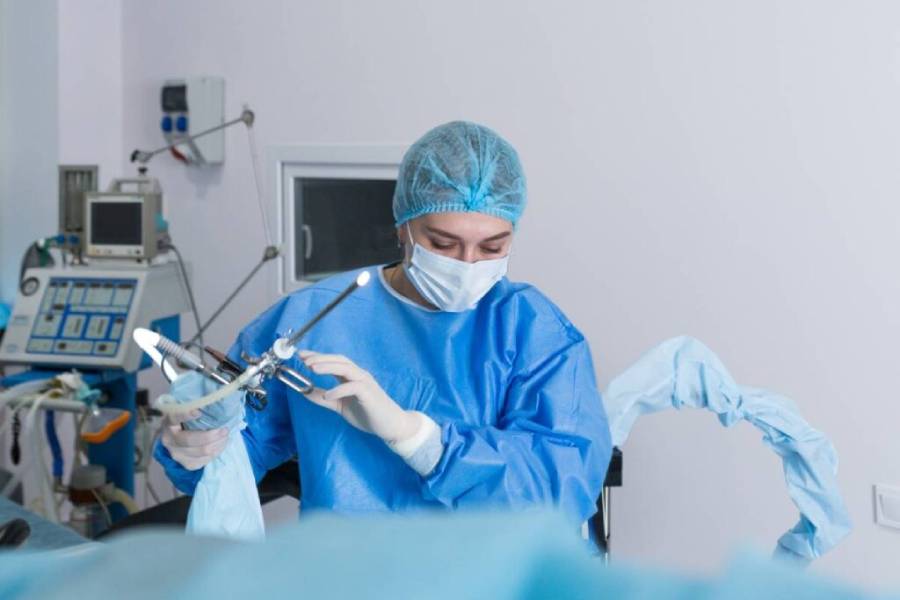What is a hysteroscopy?
Hysteroscopy is primarily used to diagnose and treat the causes of abnormal uterine bleeding. The procedure allows your surgeon to look inside of your uterus with a tool called a hysteroscope. A hysteroscope is a thin, lighted tube that a surgeon inserts through your vagina to examine your cervix and the inside of your uterus.
Hysteroscopy can be a part of the diagnostic process, as well as the treatment process.
What is diagnostic hysteroscopy?
Diagnostic hysteroscopy identifies structural irregularities in your uterus that may be causing abnormal bleeding. Hysteroscopy may also be used to confirm the results of other tests, such as an ultrasound or hysterosalpingography (HSG). HSG is an X-ray dye test used to check whether your fallopian tubes are blocked. Blocked fallopian tubes may make it difficult to become pregnant.

What is operative hysteroscopy?
Operative hysteroscopy treats an abnormality detected during a diagnostic hysteroscopy. Your provider may perform a diagnostic and operative hysteroscopy at the same time, avoiding the need for a second surgery. During operative hysteroscopy, your surgeon uses a device to remove abnormalities that may be causing abnormal uterine bleeding.
Why would I need a hysteroscopy?
Hysteroscopy is primarily used to identify and treat conditions that cause abnormal uterine bleeding, heavy menstrual bleeding, irregular spotting between periods, and bleeding after menopause.
Your doctor may perform a hysteroscopy to diagnose and correct the following uterine conditions:
- Polyps and fibroids: Hysteroscopy is used to find and remove these uterine structural abnormalities. The surgical removal of a polyp is called a hysteroscopy polypectomy. The surgical removal of a fibroid is called a hysteroscopy myomectomy.
- Adhesions: Also known as Asherman’s syndrome, uterine adhesions are bands of scar tissue that can form in your uterus and may lead to changes in menstrual flow and cause infertility. Hysteroscopy can help your doctor locate and remove the adhesions.
- Septums: Hysteroscopy can help determine whether you have a uterine septum or a malformation (defect) of the uterus that’s present from birth.
Hysteroscopy may also be used to:
- Diagnose the cause of repeated miscarriages or fertility problems.
- Locate an intrauterine device (IUD).
- Diagnose and remove placental tissue after birth.
Who is a candidate for hysteroscopy?
Your surgeon will review your medical history and evaluate your current health to determine whether a hysteroscopy is appropriate. Although there are many benefits associated with hysteroscopy, it’s not right for everyone. For example, you shouldn’t have a hysteroscopy if:
- You’re pregnant.
- You have a pelvic infection.
When should hysteroscopy be performed?
If your periods are regular, your surgeon will likely recommend scheduling your hysteroscopy for the first week after you stop bleeding. This timing will allow the best view of the inside of your uterus. If you have irregular menstrual cycles, you may need to work with your surgeon to find the best time for your hysteroscopy. The procedure can take place at any time if you’ve gone through menopause.
What can I expect after a hysteroscopy?
If you received anesthesia during your hysteroscopy, you might be observed for several hours in the recovery room. You may have some cramping or light bleeding that lasts for a few days. It’s also not unusual to feel somewhat faint or sick immediately following your procedure.
Will I have to stay in the hospital overnight after a hysteroscopy?
Hysteroscopy is considered minor surgery and usually doesn’t require an overnight hospital stay. If your provider is concerned about your reaction to anesthesia, you may need to stay overnight.
What are the benefits of hysteroscopy?
Hysteroscopy can allow your surgeon to diagnose and treat conditions with a single surgery. In addition, a hysteroscopy enables surgery that’s both minimally invasive and precise. Hysteroscopy can allow your surgeon to locate abnormalities and remove them without damaging surrounding tissue.
A Note From Dr. Shraddha Galgali:
Hysteroscopy allows doctors to diagnose and treat a variety of conditions that may be causing abnormal bleeding. To prepare for your hysteroscopy, Call Us on 9923956515 or Click on Book Appointment about the specifics of your procedure, including how long it will last and what your recovery period will be like.
